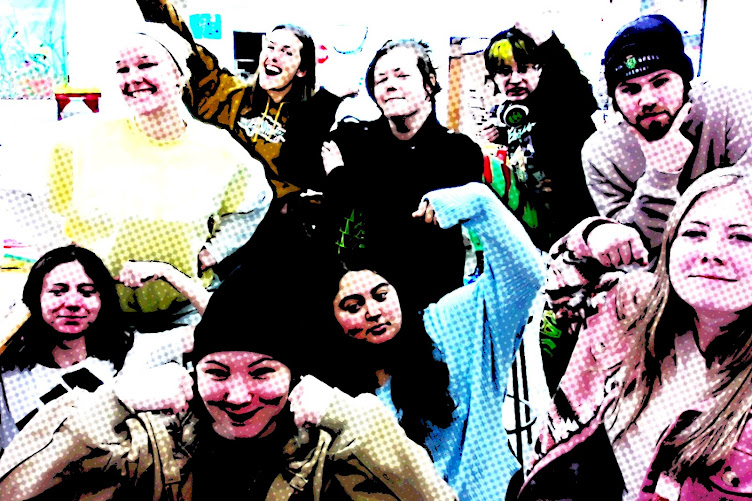This chapter focuses on Ik-Joong Kang’s Art Education
Projects, Amazed World and Happy World. In these two projects, Kang facilitates the
making of art from different cultures or communities, and displays them
together to address peace and collaboration.
They teach us about cooperation, unification, and create awareness and
empathy.
Kang’s Happy World project was an installation
mural in Princeton, were the artist collaborated with the community. The town was diverse, however somewhat
segregated with the east side being predominantly wealthy white and the west
side predominantly poor African Americans.
He had them bring a 3x3 inch painting or precious personal memento, then
had K-12 students who were bilingual to write the word library in their native
language as well as English. He received
thousands of mementos from all types of people from wealthy too poor, young too
old, and every thing in between. There were a large variety of mementos from
symbolic to literal. His hope was that
the mural could cross-different cultures and ethnicity and unit the
community.
1.
Question #1- Think of a divide in your community
(like Cedar Falls and Waterloo) and propose a project you could do with your
future classroom to unit the community? (Kate’s service project on Taking Back
Waterloo is a good example).
Kang’s Amazed World project is a multimedia
installation made up of 38,000 children’s art from 135 countries, with the
focus of dreams of the future. Kang had them draw on a 3x3 inch piece of paper
which was later mailed to him and installed together, to create a community
with our world, and become global citizens.
Most of the art Kang received was bright in mood and topic, however
there were some that depicted bad dark messages often because of their
surroundings and environment. He did
not censor any of the photos and created a wall, a wall of dreams that could
break down a wall that separates us.
2.
Can projects like this one work to unit two worlds such as eastern and
western civilizations, even with the biases and crisis in the world today?
Share another example of ways people are working to unite two diverse cultures
together to bring peace. Describe them
and share why they are successful.
Both
projects focus on uniting people whether that is a community with Happy World,
unity the planet with Amazed World. By
bringing all of these images together a strong relationship can form from the
similarities people have or create empathy for people, as well as enlighten
each other about culture and reality. Each 3x3 square is an individual and we
can make connections between their culture and ours or others. The projects created relatedness, psychic
closeness, and mutual respect by creating a bridge connecting many different
cultures and backgrounds in a community, and create a vision of the
future. Kang believes that children’s
dreams and drawings are visions of the future while displaying cultural
knowledge of the past. That the vision
of the future is peace children want peace.
These
projects could be very powerful and with today’s crisis of Syrian refugees or
bombings by ISIS and could possibly unit cultures or enlighten each other of
their visions of the future. Watching
today’s news it seems like cultures are often quick to judge often by lumping a
small group of extremists into a large religious culture because of
associations. Governors in thirty-one
states in America are protesting to take Syrian refugees in fear of an ISIS
attack because of the bombings and shootings in Paris. When in reality they have no real say only
the federal government has a say on contentious immigration. It seems that many Americans have lumped all
of these people together because of a few much like how many Americans think of
all Muslims as terrorists when in reality it is actually a very small portion
who are extremists and actual don’t follow the Koran but use it to their
benefit and in reality most Muslim communities, or countries are more similar
to ours than many people realize. The
Amazed World project could help to show how the western culture and eastern
culture are much more similar in their visions of the future.
3. Does community
unity need to become before global unity? Why or why not?
Activity:
Create an image of your dream of the future of education on
a 5x5 inch paper and post to your blog.
After break we will create our own wall.
Think back to Bill Ayers and your own experiences and write a short
paragraph with your image about your dream of the future of education. Post on your blog!
Resources:
"Reza Aslan Slams Bill Maher for Facile Arguments'
About Muslim Violence." YouTube. YouTube, n.d. Web. 22 Nov. 2015.
"What You Need to Know: Crisis in Syria, Refugees, and
the Impact on Children." World Vision. N.p., n.d. Web. 22 Nov. 2015.
"Syrian Refugees Not Welcome in 31 U.S. States -
CNN.com." CNN. Cable News Network, n.d. Web. 22 Nov. 2015.
Anderson, Tom, David Gussak, Kara Kelley.
Hallmark, and Allison S. Paul.Art Education for Social Justice. N.p.:
n.p., n.d. Print.

No comments:
Post a Comment